Agreeing the rules for after the big day
- Published
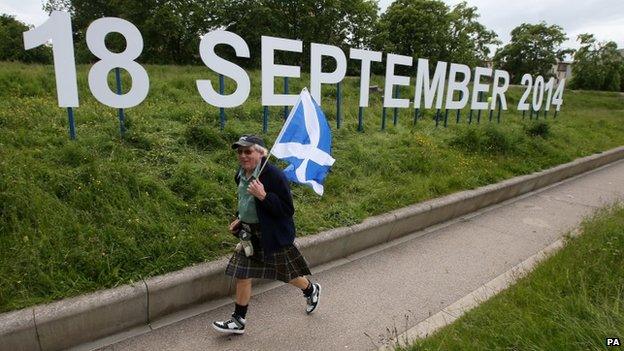
The people of Scotland will go to the polls in September to vote on their country's future
It has taken, in all conscience, a wee while - but we now have a joint statement from the Scottish and UK governments as to what will happen after the referendum.
This agreed position was expected by the Electoral Commission at the end of last year. Indeed, the Commission set a deadline of 23 December. That passed - but the document has finally been issued today.
The conclusion of this prolonged scrutiny? If you vote "Yes", Scotland will be independent. If you vote "No", Scotland will stay in the UK.
Ach, stop it, Brian. Firstly, it is important to remind people of the elemental nature of the choice - and the point that a simple majority will determine the outcome. That latter issue is frequently raised by folk.
So it is germane to state the following, as the governments do: "If more people vote 'Yes' than vote 'No' in the referendum, Scotland would become an independent country."
And: "If more people vote 'No' than 'Yes' in the referendum, Scotland would remain a part of the United Kingdom."
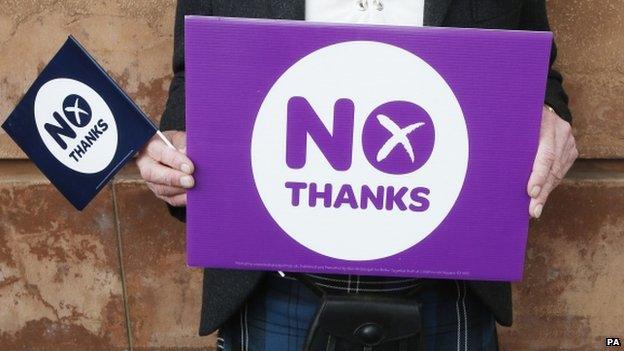
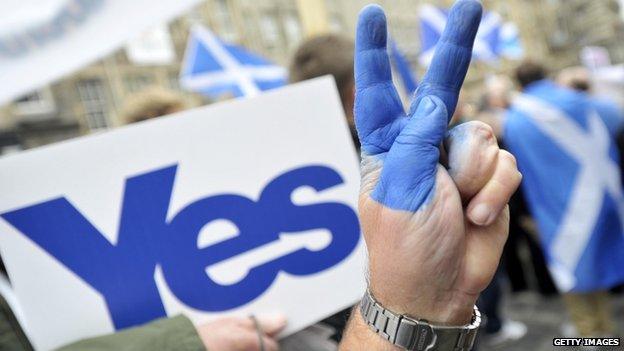
Secondly, there is much more to the statement than the basics. It is published by the Electoral Commission as part of a wider information leaflet - and will be distributed to homes across Scotland.
In the event of a Yes vote, the joint governmental statement explains that independence "would not happen straight away".
There would be "negotiations between people representing Scotland and people representing the rest of the United Kingdom".
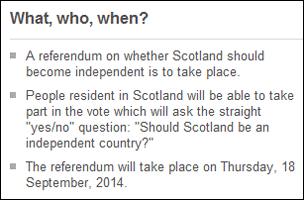
It notes that Scotland would remain part of the UK meantime - and that governance would be sustained: public services, laws, the current division of powers between devolved and reserved.
It notes further that the negotiations would include "discussion about the allocation of assets and liabilities". Thus, in a single phrase, an issue which has been highly salient throughout the campaign.
There is no mention of the Scottish government's preferred independence date of 24 March 2016. Instead, the formula used is that the current Scottish Government would carry on until the next Holyrood election in May 2016. After independence, the Scottish government would "become responsible for all aspects of government in Scotland".
In the event of a "No" vote, the statement explains that the UK Parliament and government would continue to be responsible for reserved matters such as defence, security, pensions, benefits and most tax powers while Holyrood retained control of devolved matters.
It commits the two governments to working together to implement the added powers agreed in the Scotland Act 2012, specifying the enhanced tax power.

What you need to know
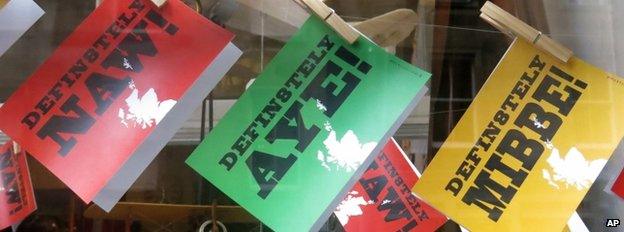

However, just as there is no reference to Independence Day, there is no explicit or detailed reference to the offer of further powers made by the three pro-Union parties. It simply states that any further changes to Holyrood powers would "be made by the UK Parliament, seeking the consent of the Scottish Parliament".
Competing offers
Come to think of it, one can easily imagine the detailed electronic bartering and discussion which must have preceded these legalistic conclusions. Scraped dry, they present the fundamentals of this referendum.
There is more to come before the document is issued. Both Yes Scotland and Better Together are being given the chance to submit a message to the voters which will be included in the final pamphlet. Expect a decidedly more evangelical tone than that, understandably, adopted by the two governments.
Will the document help? It may clear up core issues in voters' minds with regard to the process post referendum.
Will it influence the outcome? It will present competing offers. But it remains up to voters to assess those offers. There is no single sum which produces a single answer. It is a question of judgement.